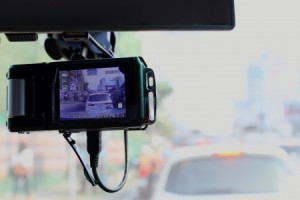‘Dashcams’ catching everything from scammers to disasters

The TransAsia accident, which left least 35 people dead and several others still missing, was filmed by at least two cars carrying dashboard cameras which have become common in Taiwan — mostly to guard against disputes after accidents.
The footage showed the plane banking steeply, apparently to avoid city buildings, and striking a passing taxi before crashing into a river from where 15 people made miracle escapes from the wreckage.
With the gadget catching on in parts of the world, particularly Russia and Asia’s more developed nations like South Korea and Singapore, it was far from the first time an astonishing event has been captured in this way.
In February 2013, a car-camera caught a meteorite plummeting to Earth in Chelyabinsk, Russia, injuring more than 1,000 people.
And last summer, a dashcam filmed a missile landing on a motorway just a few metres ahead of a speeding car in eastern Ukraine.
The cameras have become particularly popular with Russians and South Koreans as a deterrent for scammers who throw themselves onto the windscreens of slow-moving cars in a bid to claim insurance money.
The trend has spawned an amusing genre of videos of people jumping onto the bonnets of stationary vehicles and pretending to be hurt.
Dashcams have been popular for years in South Korea where they are known as “black boxes” and range from simple front-pointing cams which cost around $150, to four-way cams that cover every angle and cost upwards of $400.
The vast majority of South Korean car owners use them — primarily for insurance purposes. As in other countries, they are used as evidence in the event of a crash, and insurers offer discounts on monthly premiums to car owners who use them.
‘Major shift’ among consumers
Across the rest of Asia, the gadget’s uptake is a mixed picture: fairly popular in affluent Hong Kong and Singapore, burgeoning sales in Australia and China, and relatively unknown elsewhere.
Singapore’s largest taxi firm has installed cameras in all 16,600 of its vehicles to provide evidence after an accident, but also to encourage prudence from drivers in a society which strictly adheres to rules.
The gadgets hit the headlines in 2012, when shocking images emerged of a speeding Ferrari driven by a Chinese expatriate running a red light and smashing into a taxi at an intersection, killing the two drivers and a passenger.
While dashboard videos are mainly used to settle insurance claims, they are also fed to activist websites which shame reckless drivers by posting videos of their acts online.
Dashcams are still relatively new to Australian motorists, but are gaining popularity for their use in combating road rage. Police have urged caution, however, and warned the cams can pose a distraction on the road.
Papago, a Taiwanese manufacturer which supplies around 20 percent of the global market, said it sells around 1.0 million dash cams a year with China, Japan, the United States, Russia and Australia its main destinations.
“Sales in China has been up around 20 percent in recent years due to growing demand as there have been many fake car accidents to scam money, ” chief marketing officer Jericho Hsiao told AFP.
“With the recent news on the dashcam footage of the crash, the world is talking about them and… the exposure will help promote the product,” he added.
The habit has also started to catch on in Europe. Sales were estimated to have reached 370,000 in France by early 2014 according to magazine UFC-Que Choisir.
“We are seeing a major shift, with people equipping themselves more and more with cameras in their cars, first of all for use after accidents, but also in case of a hit-and-run,” said a spokesman for France’s Allianz and Amaguiz insurance firm, which has tied up with dashcam manufacturer Coyote.
Pierre Chasseray, head of a French drivers’ association called 40 Millions d’Automobilistes, said dashcams should become standard.
“It’s an extremely positive development in terms of road safety and it’s good in terms of ensuring drivers act responsibly,” he said. “The camera never lies.”